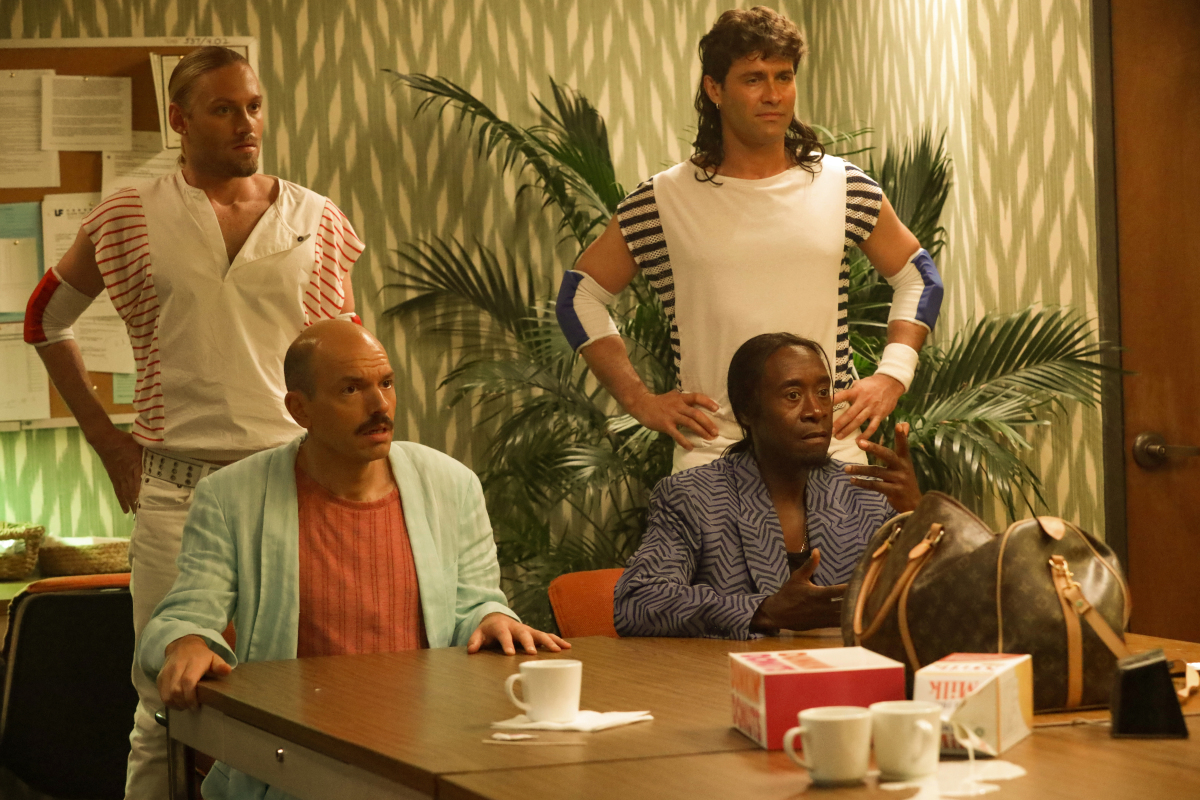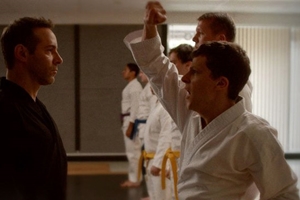A raucous comedy in the vein of Veep or In the Thick of It, but set among the jungle that was Wall Street stockbroker firms in the wild era of Reagan's unregulated 1980s. Unfortunately, it eventually suffers from some of the same weaknesses as its main executive producers' other shows and movies.
Set in the late 1980s mostly on Wall Street in Manhattan, we follow the fictional, wild and rebellious trading firm The Jammer Group, headed up by the brash and bombastic Maurice "Mo" Monroe (Don Cheadle). Exactly a year before the historically brutal stock market crash in October of 1987, Mo and his partner Dawn (Regina Hall) use shady means to hire the fresh-faced, aspiring young broker Blair Pfaff (Andrew Rannells). Pfaff, though a wide-eyed neophyte to the cut-throat world of the New York Stock Exchange, is engaged to the heiress of a massive denim empire which Mo and Dawn hope to acquire. This is just the first in countless underhanded schemes and plots that various greedy parties concoct in order to amass wealth. The first season ends with the market crash of 1987, while the second season follows most of the characters through the following year, as they deal with the massive fallout from the crash. Every step of the way, these financial predators do copious amounts of cocaine and hurl infinite crushing insults at each other.
I really liked the first season, but the second one flagged a bit for me. Maybe even to the point that I won't bother with any future seasons.
Anyone who watched Black Monday can't help but think of the Martin Scorsese film The Wolf of Wall Street, which also depicts much of the same unbridled greed and monstrous behavior of certain NYSE brokerage firms through the 1980s, '90s, and early 2000s. This show very much taps into that same vein, depicting the mad circus that can surround the ravenous pursuit of money. Tonally, the show usually operates on the same wavelength as the brilliant HBO show Veep, and it is clearly at its best when it does. The pop-culture-laced, lightning-quick, and ruthless insults really are the best thing about the show's writing, along with the constant reminders of just how garish tastes and fashion were at the time. As long as your OK with quick, clever jokes that are inappropriate in nearly every way imaginable, then you're bound to get some laughs.
The acting is also great, most obviously from one of my favorites, Don Cheadle. Cheadle has long shown his incredible acting range, and Black Monday utilizes plenty of it. As Mo Monroe, he's usually a fast-talking, charming conman, but he also has moments of gravity. Or at the very least, brilliantly feigned gravity in order to manipulate someone. The muscles he gets to flex most on this show are his comic timing and subtle comic gestures. As with many of his roles, he just commands your attention, even when he's seemingly not "doing" anything in a particular moment or scene. Equally impressive is Regina Hall as his partner, Dawn. I only really knew Hall from seeing her in Girls' Trip last year, but I hope to see her in more as she seems to have that same kind of acting agility that the very best possess. And throughout the show are plenty of other recognizable comic actors, such as Paul Scheer, Ken Marino, Horatio Sanz, and others, all of whom play their roles well.
The Interview, or comic-based fantasy show Preacher, these two genuinely funny fellows have often injected shock value into their productions where none was needed. Or at the very least, they've not always gotten the balance or the execution quite right. With Black Monday, the first season was very much like Veep, which always had a perfect sense of itself: never trying to be genuinely dramatic or overly serious in any way. Any only once or twice did I ever feel like the darkness overwhelmed the comedy. In the second season of Black Monday, though, we get a brutally, realistically bloody gunfight in a bank that kills multiple people, we have a horrifically crippled and disfigured rival of Mo slouching and slurring around offices, and some flat-out bizarrely twisted humor centering on incest. I like to think I'm a person who can laugh at a good joke about anything, as long as the joke is actually clever enough. Here, as with other shows of theirs, I think Rogan, Goldberg, and the other producers and writers mistook "shocking" for "funny" a few too many times. And the balance got noticeably worse towards the end of the second season, with more and more off-color and, in my view, unfunny gags.
If and when the show kicks off a third season next year, I may dip back in, to see if it's righted its course a bit. I hope so, since I enjoy the cast and a decent amount of the writing. But if I tune in and the first episodes offer me suicides and gory tragedies, like the second season did, then I'm out.
Set in the late 1980s mostly on Wall Street in Manhattan, we follow the fictional, wild and rebellious trading firm The Jammer Group, headed up by the brash and bombastic Maurice "Mo" Monroe (Don Cheadle). Exactly a year before the historically brutal stock market crash in October of 1987, Mo and his partner Dawn (Regina Hall) use shady means to hire the fresh-faced, aspiring young broker Blair Pfaff (Andrew Rannells). Pfaff, though a wide-eyed neophyte to the cut-throat world of the New York Stock Exchange, is engaged to the heiress of a massive denim empire which Mo and Dawn hope to acquire. This is just the first in countless underhanded schemes and plots that various greedy parties concoct in order to amass wealth. The first season ends with the market crash of 1987, while the second season follows most of the characters through the following year, as they deal with the massive fallout from the crash. Every step of the way, these financial predators do copious amounts of cocaine and hurl infinite crushing insults at each other.
I really liked the first season, but the second one flagged a bit for me. Maybe even to the point that I won't bother with any future seasons.
Anyone who watched Black Monday can't help but think of the Martin Scorsese film The Wolf of Wall Street, which also depicts much of the same unbridled greed and monstrous behavior of certain NYSE brokerage firms through the 1980s, '90s, and early 2000s. This show very much taps into that same vein, depicting the mad circus that can surround the ravenous pursuit of money. Tonally, the show usually operates on the same wavelength as the brilliant HBO show Veep, and it is clearly at its best when it does. The pop-culture-laced, lightning-quick, and ruthless insults really are the best thing about the show's writing, along with the constant reminders of just how garish tastes and fashion were at the time. As long as your OK with quick, clever jokes that are inappropriate in nearly every way imaginable, then you're bound to get some laughs.
 |
| The show does a good job early on of depicting the off-the- charts stress and the merciless heckling that goes on within Wall Street trading firms. |
The Interview, or comic-based fantasy show Preacher, these two genuinely funny fellows have often injected shock value into their productions where none was needed. Or at the very least, they've not always gotten the balance or the execution quite right. With Black Monday, the first season was very much like Veep, which always had a perfect sense of itself: never trying to be genuinely dramatic or overly serious in any way. Any only once or twice did I ever feel like the darkness overwhelmed the comedy. In the second season of Black Monday, though, we get a brutally, realistically bloody gunfight in a bank that kills multiple people, we have a horrifically crippled and disfigured rival of Mo slouching and slurring around offices, and some flat-out bizarrely twisted humor centering on incest. I like to think I'm a person who can laugh at a good joke about anything, as long as the joke is actually clever enough. Here, as with other shows of theirs, I think Rogan, Goldberg, and the other producers and writers mistook "shocking" for "funny" a few too many times. And the balance got noticeably worse towards the end of the second season, with more and more off-color and, in my view, unfunny gags.
If and when the show kicks off a third season next year, I may dip back in, to see if it's righted its course a bit. I hope so, since I enjoy the cast and a decent amount of the writing. But if I tune in and the first episodes offer me suicides and gory tragedies, like the second season did, then I'm out.








